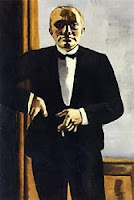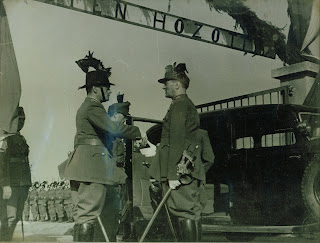In London yesterday at the Welcome Collection, looking at the collection of prosthetic limbs, I was put in mind of my godfather (he of the white glove). He died in 1976, leaving me £100, quite a large sum at the time, and a fortune saved from his meagre income. I was not able to enjoy this small windfall; my parents decided it would substitute their parental contribution to my maintenance at university that year; I had just started at Leeds.
But I am ashamed that he even remembered me: I would not visit because I was appalled by the prosthetic leg he left propped against the furniture in his tiny room in a house in Cromwell Street. The house was filled with displaced Central Eastern European aristocracy, countesses and dukes of imaginary kingdoms. My godfather, Lajos Kultsar, and his wife, Olga, were born under Hapsburg rule into refined homes and hoped to enjoy a life of privelege; they came to England as displaced persons and put their knowledge of etiquette and cooking to use as hotel staff.
This picture is taken in Spring 1944 around the time the Nazis moved into Hungarian territory and engaged the Royal Hungarian Gendarmerie to carry out their plans, which they apparently did with gusto. Why? In the belief that a German victory would restore the lost territory of 1921. It's easy to look on this as misguided from the perspective of 2010 but yet it is still an ulcerating wound in the Hungarian psyche.
 My godfather was long-time chair of the Mindszenty centre in London when that still existed. He didn't lose his leg fighting; he got a bloodclot in the late 60's, and amputation was the simplest cure for difficult conditions for poor people. In other photos I have of him, he bears a striking resemblance to Max Beckmann, especially with the cigarette in hand, carrying off the urbane elegance that characterised the early C20th.
My godfather was long-time chair of the Mindszenty centre in London when that still existed. He didn't lose his leg fighting; he got a bloodclot in the late 60's, and amputation was the simplest cure for difficult conditions for poor people. In other photos I have of him, he bears a striking resemblance to Max Beckmann, especially with the cigarette in hand, carrying off the urbane elegance that characterised the early C20th.


No comments:
Post a Comment